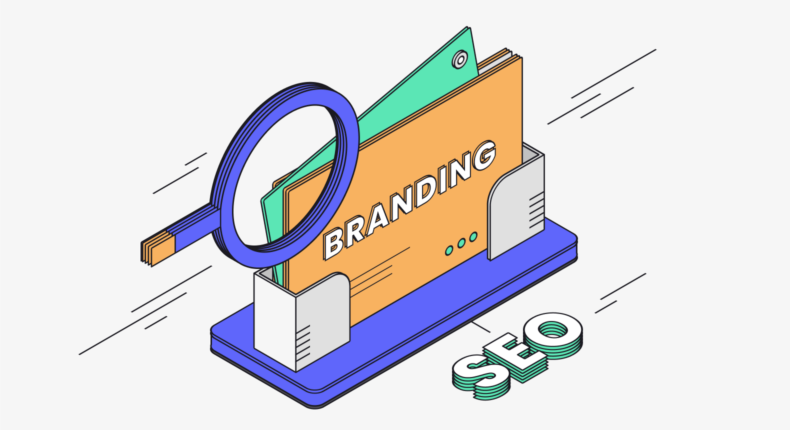Table of Contents
Studies show that brands that are consistent across all platforms can increase revenue by up to 23%, and 61% of people are more likely to buy from companies that deliver content unique to that brand.
Unique content delivered consistently is just one of many ways that brands can use search engine optimization (SEO) tactics to increase their presence to build their brand online.
Brand awareness is so crucial to SEO that, according to Moz, “branded search volume is better correlated with rankings than Domain Authority is.” This implies that branding can be an even more powerful SEO tactic than link building.
Here’s how you can leverage the power of SEO and branding to increase brand awareness, strengthen SEO, empower your digital marketing strategy, and strengthen your brand image.
The power of branding
Marketers have long known the power of branding. As Jeff Bezos once famously said, “your brand is what other people say about you when you’re not in the room,” which is to say, branding is something that doesn’t just exist on your website or in your products, but rather in the mind of the consumer.
Anything you can do to make your brand more visible and more powerful is worth your time — and there are statistics to prove it.
Branding is much more than a beautiful website, a fancy logo, or even your content — it’s about simpler things, like your customer service (73% of consumers love a brand because of helpful customer service) and authenticity (86% of consumers prefer an authentic and honest brand personality on social networks).
Here are some statistics that prove the power of branding:
- 77% of marketers feel branding is a crucial factor in future growth.
- 43% of customers spend more money on brands they are loyal to.
- Brands that blog generate 67% more leads.
- 81% of consumers said that they need to be able to trust the brand in order to buy from them.
- 66% of consumers think transparency is one of the most attractive qualities in a brand.
The importance of brand equity, brand perception, and brand recognition
Brand equity is the value of your brand in the mind of the consumer, which can be positive or negative. A brand with positive brand equity is more trusted, able to charge more, and is more likely to build brand loyalty.
Similarly, brand perception is what your target audience believes about your brand, which can be heavily influenced by the three major ways in which brands compete — on quality, price, or customer service.
What makes a lot of this frustrating for many brands is that, though they can control how they compete, they don’t have a lot of control over how customers perceive what the brand is doing.
Certainly, you can do your best to provide excellent customer service, but only your customers can decide if it’s enough to offset the price or quality of your products/services.
The opposite is also true. Take Apple. They’re not exactly known for providing great customer service, but their quality is so highly recognized that they can get away with lower-quality customer service.
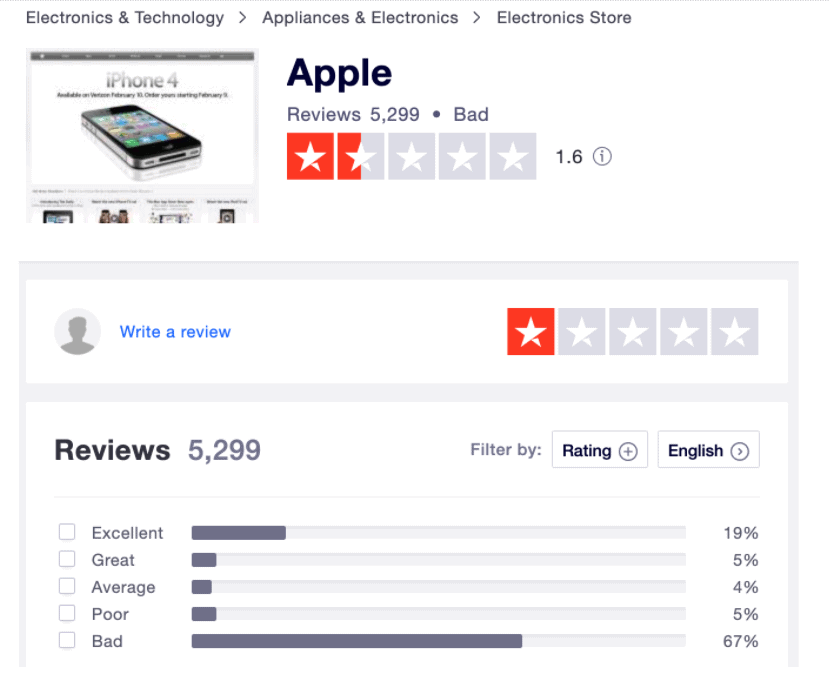
Their brand equity is such that they can charge premium rates for their products based on perceived quality alone.
Brand recognition is also important because it plays a role in how customers decide who to buy from. Nearly 60% of consumers would rather buy new products from a brand they already know than an entirely new brand. It’s just one more reason branding is so crucial, and why businesses need to use every tactic possible to make their brand shine.
What this means for brands is that how you act, how you appear, and what you do can mean the difference between success and failure.
Why branding is so important for SEO
According to Moz, “Google doesn’t rank a brand a little higher because they seem to have greater brand awareness or brand affinity, but many ranking factors that are in Google’s ranking algorithm correlate very well with brands.”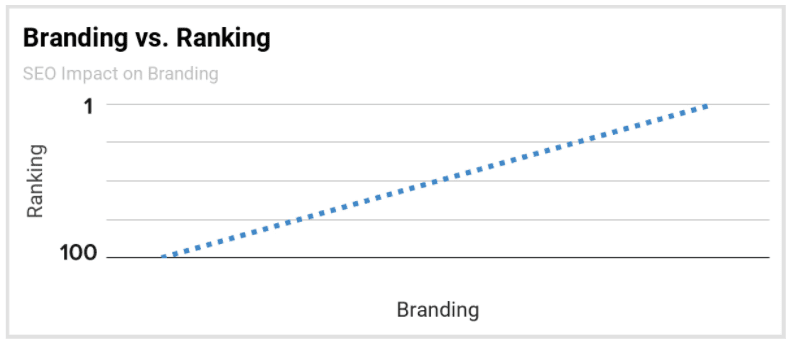
This positive correlation between branding and organic search rankings is critical to take note of. It’s clear that SEO and branding work together to improve each other. Optimizing your website for Google search can give your brand’s content a better chance of ranking, and vice versa.
When your content ranks and people see you at the top of search engine results pages consistently, this improves brand awareness. You’re exposed to more people.
When searchers click through and read high-quality content, they start to look at your business as an authority in your industry. This affects their perception of your brand — they see you as trustworthy, knowledgeable, and a brand they may consider buying from.
Remember, 61% of people are more likely to buy from companies that deliver content unique to that brand. That means brands with a strong SEO strategy (part of which is a strong content marketing strategy) are not just going to have higher brand awareness, but they’re actually going to increase conversion rates, leads, and sales, too.
It’s not just the big brands that benefit from this. Eventually, even small businesses can see the results of a good branding and SEO strategy.
As a brand becomes more recognized, more traffic is going to go to their website because searchers are going to see the brand, know that it’s trustworthy, and therefore be more willing to click, consume the content, and hopefully become a lead or make a sale.
Sales can potentially go up, your brand can become more well known in your industry (and maybe even becomes an industry thought leader), and you can charge more for your products/services because customers and potential customers will trust you more.
There’s a reason Apple computers are so much more expensive than PCs, and it’s not because their quality is that much higher — they’re simply an incredibly strong brand.
The difference between branded and traditional SEO keywords
Branded keywords are keywords that include your brand’s name in it. Apple is a perfect example.
If you type the word “apple” into Google, you’re not going to get the fruit as a top result — you’re going to get the brand.
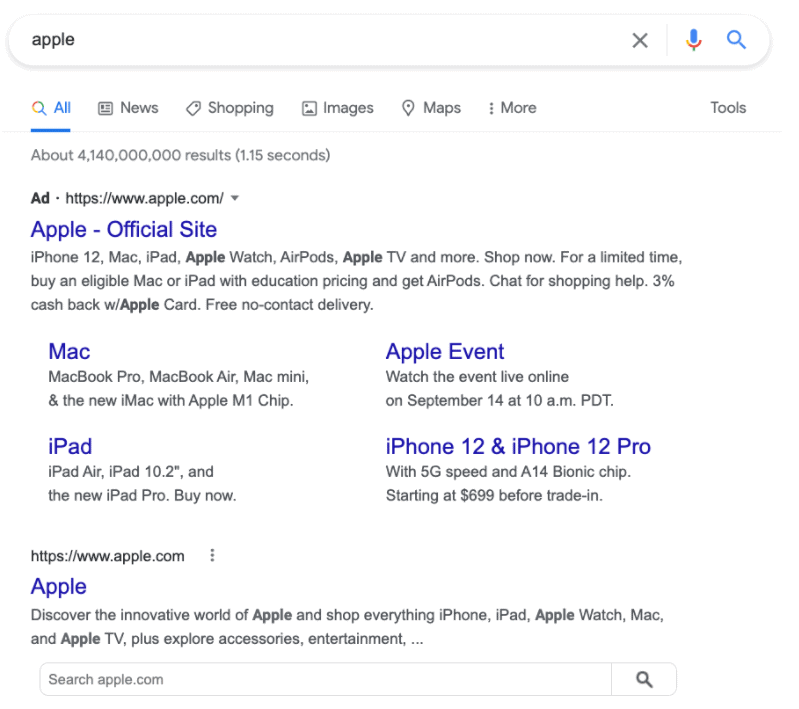
Obviously, Apple is going to have a good SEO strategy, so you can see their branded keywords show up for a variety of products. If you include the word Apple in a search for computers, you’re only going to see computers manufactured by Apple.
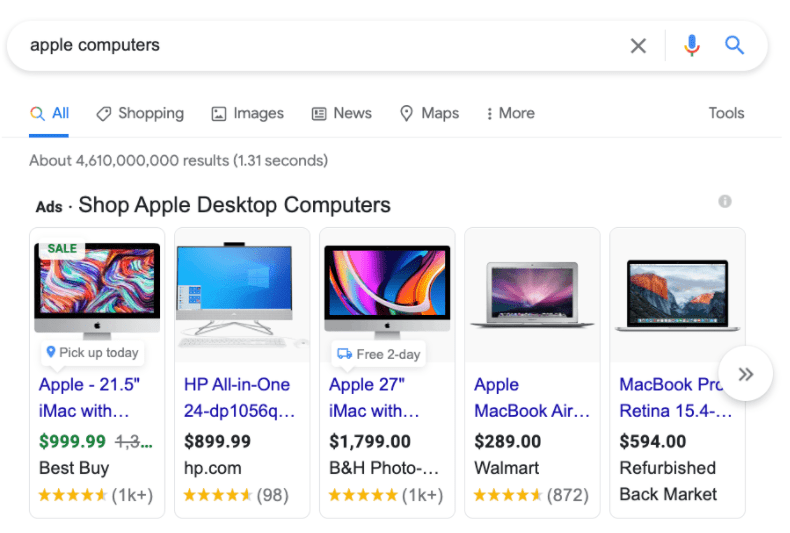
One of the biggest reasons you want to rank for your branded keywords is that, over time, people will start searching your brand’s name. Branded keywords have twice the click-through rate (CTR) of non-branded keywords.
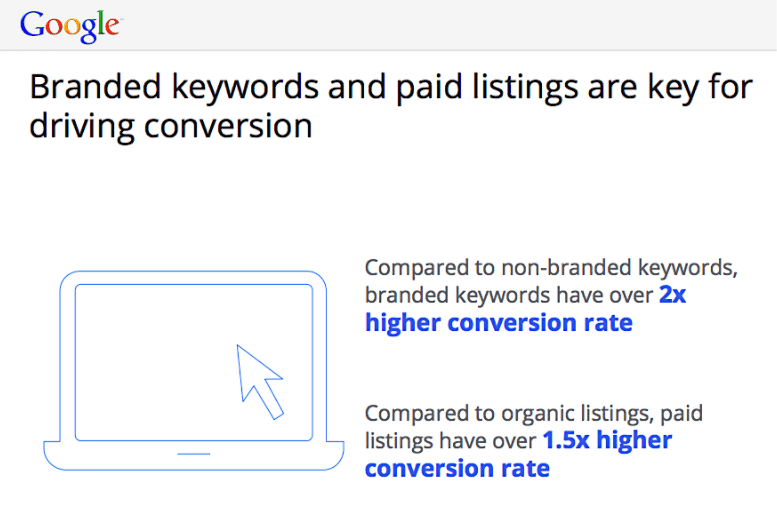
As your products and services become more well-known, people are going to start searching your branded keywords. You need to be ranking for them already if possible.
Take this SERP, for example, for the keyword “Trello vs. Asana,” two competitors in the project management space. Asana has a comparison page ranking on page one of the SERP, but Trello does not.
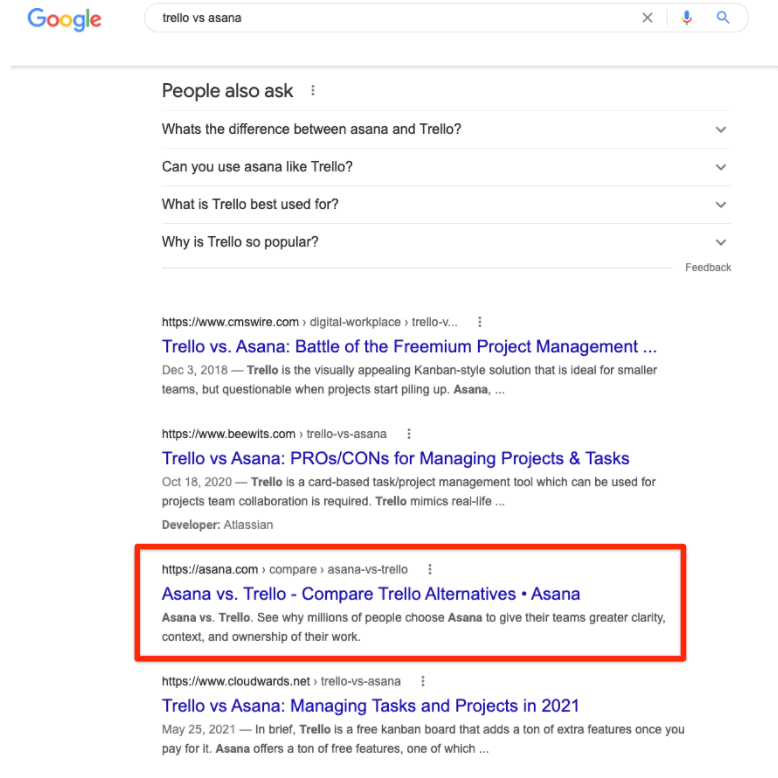
Obviously, by owning coveted SERP real estate on page one, Asana gets to control the conversation about which product is more effective. This puts Trello at the mercy of Asana copywriters, who are unlikely to paint their competitor in a flattering light.
SEO keywords
SEO keywords are unbranded. You find them through keyword research and optimize a web page, a landing page, or a blog post for that keyword, with the goal of getting more organic traffic and showing up as high in a search engine results page (SERP) as possible.
They can be long-tail keywords or short-tail keywords, and they are much harder to rank for. However, as your brand grows and you start to rank in organic search results, your SEO strategy for your unbranded keywords will start to pay off in the form of traffic, leads, and sales.
How to strengthen your brand with SEO
SEO can strengthen your brand in a number of ways by using specific tactics, like building brand partnerships, putting a strong PR strategy in place, using tools like HARO, and more. Here are the best ways to strengthen your brand using SEO.
Determine which keyword strategy is best for brand perception
While it’s of course the case that you should be optimizing both for branded keywords and unbranded keywords, sometimes you simply need to focus your efforts.
If you have high branded search volume, it might be time to optimize for branded keywords. This ensures that your competitors don’t have the chance to take over your branded keywords and rank above you on SERPs.
This becomes more important the larger your brand grows. You don’t want to miss out on potential sales as a result of not optimizing for these keywords.
If you have low branded search volume, it’s probably best to, right now, optimize for traditional keywords. Traditional keywords may be harder to rank for and have lower conversion rates, but over time, they position your brand as a thought leader in your industry.
Before people will start searching your brand, they need to be aware that you exist. Traditional keywords help you get your brand in front of the right people.
Given that 74% of tech B2B customers consider 3 or more companies when purchasing, and that 67% of tech B2B customers were not sure what company to purchase from, the stronger you can make your brand, and the more well-known you can make your brand, the better your chance of making a sale and building a relationship.
Build brand partnerships
Building partnerships with other brands is an essential part of SEO, but it can also help with branding. This means partnering with brands that relate to your brand in some respect.
This might include brands that sell a product or service that complements what you sell, or it might mean brands that sell a similar product/service but with whom you are not in direct competition.
These types of brand partnerships build your brand in two key ways.
First, they allow you to generate backlinks, which are reputational signals to Google. Usually, backlinks are built when your partner brand links to a page on your website from their content.
They can also come from guest blog posts, where you write a blog post that is published on their website and link back to your own content.
This leads to the second great way that brand partnerships help with SEO — they allow you access to another audience. Guest blog posts are now in front of their audience, however large that happens to be, and if you’re optimizing those posts for search, you’re drawing in traffic that may trust their brand quite a bit, leading them to trust your brand in turn.
You can also cross-promote on social media, again getting in front of a different audience of potential customers. There’s also a correlation between social engagement and backlinks. Content with higher social engagement tends to have more backlinks.
Just as Google treats backlinks as signals of quality, social engagement also signals to Google that your content is high-quality.
[Granwehr-cta title=”Get help with SEO” text=”Want help with SEO branding? Talk to a proven consultant.”]
Develop a PR strategy
PR is great at building brand awareness. For example, if you’re able to regularly get press releases published in national publications, or even local publications, you’re building brand awareness in your community and your target market.
PR today also often bleeds into social media, where crafting the right message about your brand is critical to showing followers that your company is aligned with their values. It’s also important to give your followers a way to quickly get issues resolved through social media, preserving your brand’s image.
When there are problems with your brand – a customer service issue, a product/service issue, or even an issue with an employee, PR helps you mitigate those problems while protecting the brand.
PR can also create opportunities for exposure and backlinks. When creating press releases that have a chance of getting picked up in the news, think like a journalist.
What do they want to cover? A new product release? A story about service to your community? There are so many outlets now that you can find someone to cover just about anything as long as it’s relevant and interesting to a particular audience.
At the same time, getting in touch with journalists can be difficult, so use tools like HARO, which has feeds that show you what journalists are looking for so that you can create content (or share existing content) that fits their needs.
If you can position yourself as an authority that can speak to what the journalist is looking for, and if you can craft a great pitch, you’re going to be more likely to get your content picked up. That means generating brand awareness at a much higher level than you might otherwise be able to.
Brand mentions
Another benefit of a strong PR strategy is that it gets people taling about your brand online. When your brand is referred to on the internet, either on social media or in another piece of content, like a blog post, this is known as a “brand mention.”
Brand mentions can not only boost your brand’s visibility online (and therefore help you rank for branded keywords), but they can also give you an opportunity to get links.
You can reach out to people who mention your brand online and see if they’re willing to link to your website. In this way, you’re turning brand mentions into backlinks.
Google has also directly said that search engines use brand mentions (without links) for ranking purposes:
“If you publish high-quality content that is highly cited on the internet — and I’m not talking about just links, but also mentions on social networks and people talking about your branding — then you are doing great.”
Bing also has said that brand mentions can be as important as backlinks.
Optimize for EAT factors
EAT stands for expertise, authoritativeness, and trustworthiness. It’s one of the ways Google evaluates your website when trying to determine if it should serve your content to searchers.
The problem that EAT addresses is that anyone can make a website and put content on it, but that doesn’t mean they know what they’re talking about. You can convince Google that your brand is an authority in your industry by following some EAT best practices.
Expertise
Expertise is gauged in different ways for different categories of websites and industries. For example, medical websites are held to very high standards by Google because they can have a profound effect on a searcher’s life.
To demonstrate expertise, not only must the content be high-quality and filled with links to expert references, but the authors themselves are expected to demonstrate that they are highly qualified.
This might mean education or it might mean years of experience. Include this information on your about page and in each author’s bio to show that each writer is an expert in their field.
Authoritativeness
Some of EAT overlaps, and this is true of authoritativeness. Not only does authoritativeness refer to the content itself, but just like expertise, it refers to the creator of the content. It also refers to the website as a whole.
This matters because even if your writer isn’t necessarily the highest authority in an industry, if your business (and the associated website) is considered an authority, the content can still be considered authoritative.
Authoritativeness can also be shown through backlinks to your site.
The more web pages that link to your content, the more it shows Google that you are a valuable and authoritative source of information. That’s why link-building should be one of your main goals for your content to satisfy EAT factors (not to mention the fact that backlinks are the second highest Google ranking factor behind high-quality content).
Trustworthiness
Trustworthiness also overlaps with authoritativeness. Some aspects of your website, like whether or not you have an SSL certificate, matter here, but so do backlinks and reviews. Another important aspect of trustworthiness is having a privacy policy on your website, a contact form, and using HTTPS.
If you combine these together, you have a website, an author, and content that can all be trusted.
For example, if you have a website about testosterone replacement therapy, and the articles are written by a doctor with decades of experience, the articles are well-cited, the website has lots of backlinks, and it has an SSL certificate and a privacy page, then Google is likely to say that both the website and its content satisfy the requirements of EAT.
Brand building with other channels
Branding can take place in a huge number of marketing channels, all depending on your target audience and what message you want to get out to whom.
For many modern brands, social media is a huge brand-building avenue. You can establish the voice of your brand and get it out in front of a large audience by participating in social media events, like live streams and tweet chats, allowing them to hear the voice of your brand and respond in real-time.
Other marketing channels, like outdoor marketing, sponsorships of events, direct mail, and TV/radio advertising all contribute to your target audience’s perception of your brand.
You may not be able to control what they think about your brand, but you can certainly influence it. The more your brand is seen and heard, the greater your influence.
As mentioned, digital marketing channels like social media are used by Google to understand how it should rank your content, contributing to the SEO of your brand.
Research supports this. A study by CognitiveSEO found a clear correlation between social network presence and site rankings.
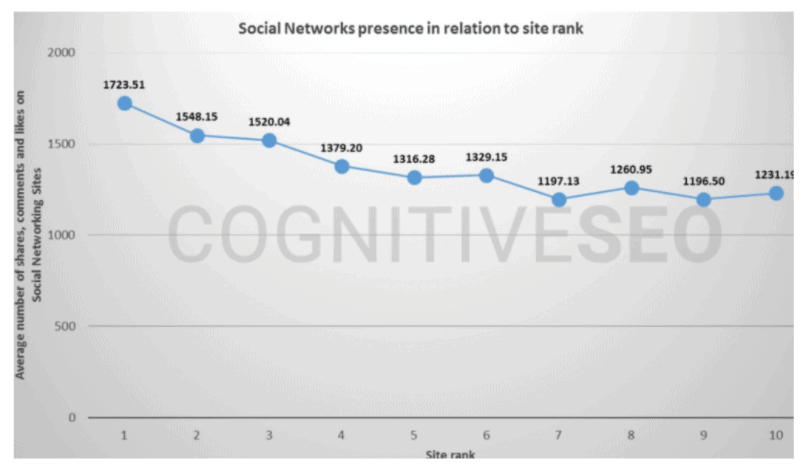 Of all modern marketing channels, social media is among the most important to SEO, so investing time in social media is worthwhile for brands who want to improve their presence online.
Of all modern marketing channels, social media is among the most important to SEO, so investing time in social media is worthwhile for brands who want to improve their presence online.
Optimize for branded keywords
As mentioned, sooner or later, you’re going to want to optimize your content for branded keywords. This might mean optimizing your homepage, for example, for your brand name.
In some cases, brands already have branded search volume that they can take advantage of. For example, a landscaping business called, “Dallas Landscaping” will certainly have an already-existing branded keyword phrase, “dallas landscaping,” as people will be searching that phrase looking for a business just like theirs.
In this case, optimizing for branded keywords should be a top priority. In other cases, branded keywords may have to wait until the brand has grown large enough that people begin to search for it online.
A new attorney, for example, may need months or years before people start searching for their name online. Many of the tactics described in this article, like creating press releases, or building brands through social media, will also help to target branded keywords.
For example, you can add a hashtag that includes your brand name (or a branded keyword of your choosing) on all your social media posts. This ensures that any time you put out content on social media, your followers can find it, but it also builds the brand if others start to use the hashtag.
If you’re regularly putting out press releases and getting links back to your website, this in turn helps your branded-keyword-optimized pages to rank higher, boosting your overall rankings for those branded keywords.
Continuously add value
If you want the perception of your brand to be great, you have to consistently add value. Creating high-quality content is the best way to add value, and it also happens to be the best way to rank on Google.
Google prioritizes high-quality content above all else, even above backlinks, which are the second-highest ranking factor.
High-quality content is defined as content that “closes the loop.” A loop is the process during which searchers click on a result on a SERP, don’t find what they’re looking for, and then return to the SERP to click on another result.
When your content delivers what they’re looking for by matching their search intent (the intention that they have when entering a search query into Google), then they stop looping — the loop has been closed.
Loops close when searchers find content that gives them value. It answers their query fully and completely, and they don’t feel the need to keep looking — they’ve found their answer.
If you’re continuously creating high-quality content, you’re continuing to add value. Searchers will find you, see you as an authority in your industry, and then consume your content. When it’s time for them to buy, you’re who they’ll turn to.
Get a complimentary SEO audit
Whether you’re a small business owner, a startup, or the marketing director of a huge firm, SEO branding can be a key driver of growth.
Branding boosts SEO in a number of ways, including through mentions and branded keywords, but also through press releases and other marketing channels. SEO boosts branding, and branding boosts SEO. They work together.
This helps your business to not only become more visible online and more likely to be seen by your customers, but it also helps generate more qualified traffic to your website.
Want to see how you’re doing with SEO? Get an instant SEO audit below. Or, schedule a free consultation with our marketing agency to see how intent SEO can boost search traffic revenue by 700%.
